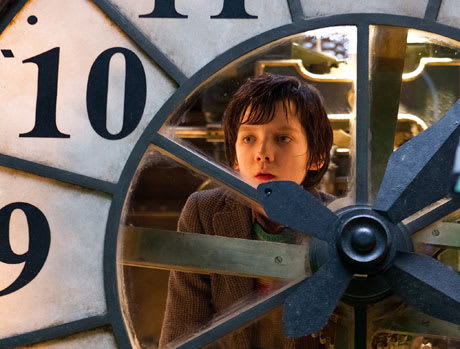From the opening moments of Hugo, Martin Scorsese's magical, hypnotic and beautiful testament to the power of celluloid, when the camera speeds through a train station crowded with people capturing the geography and environment with maximum aesthetic wonderment in three dimensions, it's abundantly clear that this is a special, bigger than life, work.
More than a mere story about the titular Hugo (Asa Butterfield), an orphan boy living in the walls of a train station in '30s Paris, this is an impassioned tale about the power of belief and purpose, connecting the roots and history of cinema to the amazement of being transported into dreams and other worlds, even temporarily.
With a nod to Fritz Lang's Metropolis, this touching tale for children and adults alike finds the young orphan trying to reassemble a broken automaton in the hopes that it will deliver a message, or some guidance, from his deceased father. His efforts bring him in contact with the curmudgeonly and despondent Georges Mèliés (Ben Kingsley), and his exceedingly literate wordsmith granddaughter, Isabelle (Chloë Grace Moretz), with whom he develops a unique bond.
Beyond assessing the importance of history and devastation of war, noting that the first World War decimated the nascent wonder and love of cinema, Hugo is also cognizant of time and acting on desires before they pass you by. Clocks and gears are present in virtually every frame, frequently juxtaposed with the tentative romantic assertions of Hugo's nemesis, the Station Inspector (Sacha Baron Cohen), and a comely flower entrepreneur (Emily Mortimer).
Ignoring the contradictory anti-war message that individual purpose and specialness ― the very human delusions that create solipsism, entitlement and, ultimately, conflict ― are our lifeblood, there's a heartfelt feeling of connection and the identification of personal meaning that make this a universal, connective parable. You would be hard-pressed to find someone that isn't moved by the sincerity of this deeply personal story and its greater human importance.
Still, for all of the emotion on display, this, like all of Scorsese's works, is more about exactitude and technical proficiency than the messy realities of being alive. Every frame is rich with life and 3D spectacle, and every sequence flows with seamless editing and virtuoso construction.
But works of specificity, no matter how sincere or passionate, have a coldness to them no matter how remarkably executed. While there is an overwhelming feeling of witnessing a once-in-a-lifetime masterpiece once the credits roll, the emotional element is somewhat restrained by the very lack of risk-taking that makes this a work of near-perfection.
Of course, this is just a minor quibble in an event that manages to transport us back to our first experiences with cinema, dreams and even romance. It's rare that a film can reinvigorate the youthful passions long swept away by the realities of an imperfect, harsh and selfish world.
(Paramount Pictures)More than a mere story about the titular Hugo (Asa Butterfield), an orphan boy living in the walls of a train station in '30s Paris, this is an impassioned tale about the power of belief and purpose, connecting the roots and history of cinema to the amazement of being transported into dreams and other worlds, even temporarily.
With a nod to Fritz Lang's Metropolis, this touching tale for children and adults alike finds the young orphan trying to reassemble a broken automaton in the hopes that it will deliver a message, or some guidance, from his deceased father. His efforts bring him in contact with the curmudgeonly and despondent Georges Mèliés (Ben Kingsley), and his exceedingly literate wordsmith granddaughter, Isabelle (Chloë Grace Moretz), with whom he develops a unique bond.
Beyond assessing the importance of history and devastation of war, noting that the first World War decimated the nascent wonder and love of cinema, Hugo is also cognizant of time and acting on desires before they pass you by. Clocks and gears are present in virtually every frame, frequently juxtaposed with the tentative romantic assertions of Hugo's nemesis, the Station Inspector (Sacha Baron Cohen), and a comely flower entrepreneur (Emily Mortimer).
Ignoring the contradictory anti-war message that individual purpose and specialness ― the very human delusions that create solipsism, entitlement and, ultimately, conflict ― are our lifeblood, there's a heartfelt feeling of connection and the identification of personal meaning that make this a universal, connective parable. You would be hard-pressed to find someone that isn't moved by the sincerity of this deeply personal story and its greater human importance.
Still, for all of the emotion on display, this, like all of Scorsese's works, is more about exactitude and technical proficiency than the messy realities of being alive. Every frame is rich with life and 3D spectacle, and every sequence flows with seamless editing and virtuoso construction.
But works of specificity, no matter how sincere or passionate, have a coldness to them no matter how remarkably executed. While there is an overwhelming feeling of witnessing a once-in-a-lifetime masterpiece once the credits roll, the emotional element is somewhat restrained by the very lack of risk-taking that makes this a work of near-perfection.
Of course, this is just a minor quibble in an event that manages to transport us back to our first experiences with cinema, dreams and even romance. It's rare that a film can reinvigorate the youthful passions long swept away by the realities of an imperfect, harsh and selfish world.




